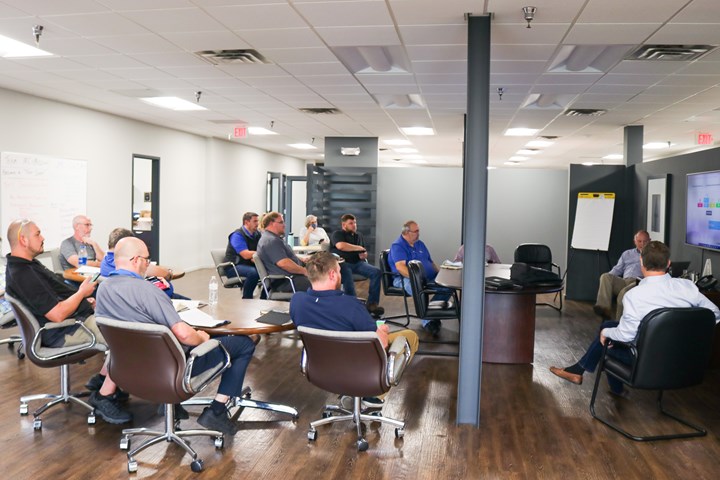
B-Square Precision Group's CEO Mark Beck and CFO Tony Butler empower the leadership of both KAM Tool & Die (Zebulon, North Carolina) and JMC Tool & Machine (Sanford, North Carolina) to collaborate and build teams that can take each company to the next level. Here, leaders at JMC & KAM meet to learn new “business system” tools. Photo Credit: B Square Precision Group
With the average age of mold shop ownership nearing 60 and many owners wanting to settle into retirement, an acquisition sounds like a sensible option as long as their people are put in good hands. And therein lies the problem.
People in mold manufacturing matter most, because it's more like a brother and sisterhood than an industry. So, as the stories of private equity firm buyouts gone wrong persist, ownership is very hesitant to go down the M&A road.
So what makes for a successful acquisition? If you ask me, it's considering all aspects of the human side of the business, as well as taking into consideration and care the employee's health, safety, success and growth. And this means a heavy focus on a culture of leadership and lean.
This is precisely what B-Square Precision Group's CEO Mark Beck and CFO Tony Butler did. And they are on the hunt for a quality mold manufacturer to add to their North Carolina-based high-precision manufacturing company.
Coming Together
You might be wondering how Mark and Tony came together. For starters, Mark has five kids, and Tony has 11, which indicates that, right from the start, they’ve had that big family mentality in common. Add to that a strong focus on faith, marriage, community, education and business management, and you have a powerful partnership.
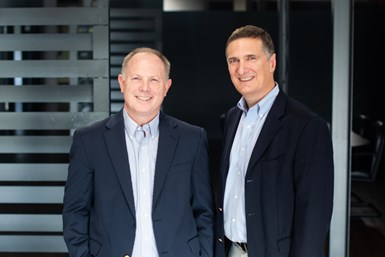
Mark Beck and Tony Butler bring a unique accelerator/brake partnership to B-Square—Mark is the accelerator and Tony is the brakes. Put another way, Mark is the idea man, ready to implement, and Tony is cautious, methodical and very detail-oriented.
However, the personalities of every successful partnership have differences too, and Mark and Tony are no exception. Mark is an idea man, ready to implement, and Tony is cautious, methodical and very detail-oriented.
"Mark is a visionary and can paint a big picture of the future and what's possible. I'm one to focus on how to make that happen, so I tend to look at constraints and available resources," Butler says.
They have a unique accelerator/brake partnership, according to Beck. The analogy he gives people is that he is the accelerator on this car, and Tony is the brakes. "If you think about it, if you only have an accelerator, you would only drive your car five miles per hour. You would never go 50 or 60 or 100, but if you have a solid set of brakes, then you can go as fast as you want because you can stop when you need to. I value Tony as the brake even more than I value myself as the accelerator. We're a great team," Beck says.
Reflecting upon the reason why he chose to team up with Butler in a manufacturing venture, Beck says that, despite a lot of time spent in the office and management meetings, the happiest times during his corporate stint were his visits to various company manufacturing facilities, vendor operations and customer sites where innovation happens. So, when the novelty of his semi-retirement faded, the idea of starting a manufacturing company was born.
Butler made the move with Beck because he was seeing increased reshoring initiatives and trusted Mark's background, experience and connections. "Mark was the humblest CEO/senior executive who I had ever met. I could tell that he was the 'real deal.' He was firmly and fully in control of all his abilities and passions and could direct them to bring about good with ease," Butler says.
Another reason Beck picked manufacturing was that it was these types of companies that he would contract throughout his career, and as a result, build a vast network of contacts that he can now leverage to grow B-Square. Beck notes that although he cannot walk up to a CNC machine and program it, he knows the difference between a mill and a lathe. More importantly, he understands lean and leadership, and that is where he believes he can make a difference.
This duo has a vast amount of experience that lends itself well to a high-precision manufacturing business. Mark is a Harvard graduate and an accomplished leader with demonstrated capabilities in both strategy and execution. He has been successful in launching multiple start-up businesses and leading corporate turnarounds, often bringing lagging businesses into positions as market leaders, including Corning Inc., Danaher Corp. and JELD-WEN Inc.
Tony is a numbers guy who attended Brigham Young University, where he earned a BS and MS in statistics, attended one year of law school, then finished his schooling with an MBA. For most of his career, he has applied his skills primarily in the realm of commercial real estate securitization as well as finance and investments, including the Church of Jesus Christ of Latter-Day Saints, Koch Industries, First Union/Wachovia and RAIT Financial Trust.
In 2018 Butler teamed up with Beck to create the B-Square Precision Group. Both men have exceptional entrepreneurial roots and long-time experience working in the corporate world. Still, their true passion lies with manufacturing and applying proven management practices to the precision machine component (and related) space.
"We are different because we love investing in people and using our experience to streamline operations and improve the customer experience. We aim to help these companies reach their full potential."
Building Blocks
To date, B-Square Precision Group (Charlotte, North Carolina) comprises KAM Tool & Die (Zebulon, North Carolina) and JMC Tool & Machine (Sanford, North Carolina). KAM Tool, which became the first member of B Square in December 2018, builds and reverse engineers tools, dies, fixtures and molds. JMC, which was acquired in 2019, provides precision machined components and assemblies (10,000 to 30,000 parts per year) to the medical, industrial, aerospace and pharmaceutical markets.
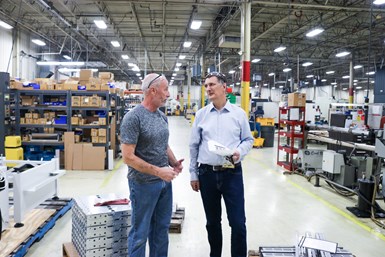
To build the right culture from the start, Beck and Butler tailored their approach to each company, each situation and each workforce. Here, Tony Butler and Frank Patkunas, JMC VP of Operations, walk the factory floor.
"KAM is more of a prototype quick-turn shop with strong EDM and machining capabilities, and with JMC, we picked up a respected short-run production house with Swiss capabilities, turning, horizontal and vertical milling, laser cutting, a press brake, welding and assembly. JMC is a nice tie-in to KAM," Butler says.
Both companies are ISO 9001-2015-certified. JMC is on track to obtain the ISO 13485 certification by the end of the year, which is a proof of Quality Management System (QMS) compliance to the standard for organizations involved in the medical device industry.
Butler and Beck were sold from the start on KAM's robust EDM capabilities, pharmaceutical opportunities given its location and the skilled tradespeople running the day-to-day activities in the shop. They were also impressed with JMC's facilities, overall capabilities and the ownership team. To compare, KAM does around $3.5-$4.0 million a year with 20 employees, and JMC has a workforce of about 50 and does $8 million a year.
Now, Beck and Butler are trying to build a group of companies that cover the precision manufacturing spectrum, with a goal to add three more to the B-Square family. Next on their list is a mold builder. They are looking for owners with high character and a business with a diverse customer base with long relationships.
"We look for companies that can cross-sell for each other, eliminating what we call a customer concentration problem. Many smaller shops have a customer dependency problem, but if you combine, let's say, five companies that each have a customer concentration problem into one company, you eliminate any customer concentration problems. Then you can grow," Beck says.
Listening, Leading and Getting Lean
The key to B-Square is culture. Beck always found himself working with management who was not always as committed to culture as he wanted to be. "I felt a little constrained," Beck says. He saw this as an opportunity to build a company culture the way he always thought it should be done, and make the people priority number one.
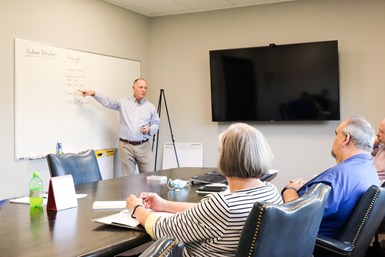
Mark Beck leads a working session to streamline work flows between JMC & KAM. Meetings like this are important to building successful teams.
"We are different because we love investing in people and using our experience to streamline operations and improve the customer experience. We aim to help these companies reach their full potential. We keep the businesses we acquire and their brands autonomous, we invest in new equipment to grow the companies, we leverage world-class operating techniques and we provide training to every team member," Beck says.
Let's take a look at the first acquisition. Randy Jones is the general manager of KAM Tool & Die. Under previous ownership, he was the operations manager. With more than 25 years with KAM, he can attest to the positive changes put into place by Beck and Butler.
Although KAM's previous ownership continually invested in technology, it was the training that started to wane as their retirement neared, which was a sign to Jones that things would be changing. He was brought on board once the owners decided to move forward with the acquisition, but they instructed him not to share the news just yet—a hard demand to place on a man who sincerely cares for the workforce. "I'm a people person. I love my employees. Their families, their education and their training, mean a lot to me. Holding onto that information for ten months was very difficult," Jones says. The good news was Mark and Tony's people-first philosophy was a perfect fit.
As the acquisition moved forward, Jones' greatest fear was the new owners picking apart the company and moving it to another location, which is a common outcome of many acquisitions.
"KAM has excellent relationships with all of its customers. So good in fact, that we never hired a salesperson throughout our 24 years. That says a lot about our quality and commitment to our customers. I did not want to see that fall apart," Jones says.
One of the current owners also believed strongly in KAM's people, so he worked a stipulation into the buyout contract that kept the company as-is for a specific time frame. This fits nicely with Beck and Butler's focus on building B-Square with local businesses and not immediately bringing in any outside people.
After the acquisition was complete, Beck and Butler came into KAM and showed a presentation of their four foundational values.
- Integrity—Do What Is Right
- People—The Best Team Wins
- Customers—Be a Trusted Partner
- Performance—Improve Every Day
Next, they met with each employee one-on-one to learn likes, dislikes and future career and educational goals. Beck and Butler both believe that to gain employee buy-in, you must immediately start investing in the people and improving their environment.
"Listen. Get their ideas regarding what can and should change, then do as many as you can (the easy ones) right away," Butler says. "Most of the time, if you allow people to shine, to grow and to progress, they will not disappoint you."
For the first quarter, Beck and Butler allowed the KAM team to do their thing and sat back, watched and learned. They recognized that they were coming into this machining world blind, so watching and listening was vital. They lead by putting the employees first.
Jones says Beck and Butler are committed to being there for the people, but they do not run the business. They are not micro-managers. "I couldn't ask for better leadership on their part," Jones says.
Beck and Butler also understand the value of giving back to the employees. "I couldn't ask for anything better. What they've done for me in the last year and a half has been more than the previous ownership did in 24 years," Jones says. For example, showing appreciation with immediate raises and bonuses, and not just for Jones but the whole shop. And instead of coming in and cutting benefits, they improved them—increased the 401K match and decreased healthcare costs, etc. "The more you give back, the more employees give," Jones says.
Then there are lean initiatives that have had a significant impact on KAM. Two fundamental changes supported their lean approach: a TPM (total productive maintenance) implementation and a scoreboard strategy.
After the first quarter, Beck initiated a visual scoreboard that tracks five metrics: safety, on-time delivery, quality, maintenance and cost. Each metric has a champion (on an annual rotation) who reports on their area during the team's daily stand-up meeting.
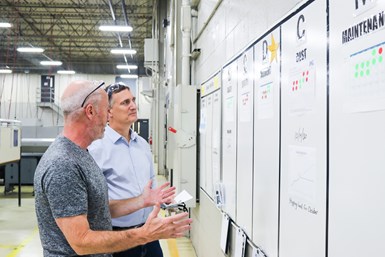
Tony Butler discusses the Scoreboard with JMC’s VP of Operations Frank Patkunas that tracks safety, on-time delivery, quality, maintenance and cost.
"We place a green dot on the scoreboard for every goal that we meet and a red dot for each goal we do not meet. This is posted for everyone to see, which promotes accountability. Then every Monday, we send Mark a report," Jones says. "It's important that people know whether they won or lost every day. Did we succeed? Did we fail?" The scoreboard helps with that communication as does a new Job Well Done board.
Then on the side of the scoreboard, there is an Employee Training matrix, which helps each employee identify their strengths and weaknesses, and specific areas for improvement, which are posted for everyone to see and to provide a tool to request training in specific areas. KAM has also identified a Training Champion.
Beck and Butler committed to training by bringing trainers in and offering tuition aide. Plus, they also purchased an unlimited training package from Haas that allows employees to take training courses in its local Greensboro, North Carolina, facility whenever they want. "We have also ramped up our training programs with middle schools and local colleges through NC Works," Jones says.
Tied to training is mentorship, and Beck believes strongly in mentoring. Once a quarter, he comes in and assigns tasks to help improve skills to get employees to the next level. Currently, he is mentoring a supervisor, mechanical engineer and programmer at KAM.
B-Square also offers opportunities for employees to train at the other facilities, which may present different career options not available before this acquisition. Plus, this helps to keep them within the B-Square family.
Other changes include improved tool crib and general shop conditions, investment in additional equipment, lunch-and-learn activities and various bonus initiatives.
Beck and Butler are committed to being there for the people, but they do not run the business. They are not micro-managers. "I couldn't ask for better leadership on their part," Randy Jones, general manager of KAM Tool & Die, says.
Common Perspective; Different Approach
Due to the timing of the acquisitions, Beck and Butler have completed more at KAM than JMC, but JMC already has benefits of its own to share about the acquisition.
Howard Nystrom is the general manager and president of JMC Machine & Tool. He is one of the three previous owners of JMC, with over 20 years dedicated to building this machining operation. A couple of years ago, the owners began having serious discussions about the future of JMC as they transitioned to retirement, keeping in mind their guiding principle: Always make decisions based on what is best for the success and future of JMC. After much thought and analysis, they decided that selling the company was the best route to continued growth.
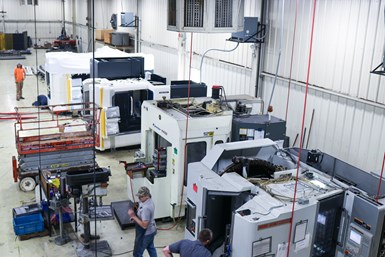
Beck and Butler love investing in people and using their experience to streamline operations and improve the customer experience. They keep the businesses they acquire autonomous, invest in new equipment, leverage world-class operating techniques and provide training.
As a result, they announced this decision to their 50 employees and began to transition to the new ownership in September of 2019. The three were adamant about keeping things the same for their people for an extended period, as Beck and Butler got to know the business. Again, this was precisely what Beck and Butler had in mind as they believed in JMC, the current team and the ownership.
Beck and Butler tailored their approach to each company, each situation and each workforce. "They were not going to force a round peg in a square hole," Nystrom says. For example, at KAM, one of the owners stayed on for a limited time, and at JMC, three owners were going to stay on and be heavily involved in the operation.
"My perspective about this acquisition may be a little different from Randy's, as I am one of the original owners, but like Randy, I am impressed with the quality of leadership and the focus on the people side of this business," Nystrom says.
What did Nystrom like about B-Square? In a nutshell, Beck and Butler had a good story—their backgrounds, interest in staying in North Carolina, a solid growth strategy for building a precision manufacturing business and a timeframe of a minimum of 10 years, which is not typical of an acquisition, according to Nystrom. "We felt like they understood manufacturing and truly wanted to continue the legacy of JMC and build the company. Their values were our values even though we never wrote ours down," Nystrom says. Beck and Butler took the time to get to know everyone.
Nystrom's initial path after the acquisition was to focus on sales because that was one area of the company that he was responsible for already. "JMC has a very contact-driven sales and marketing strategy. We did a lot of face-to-face development of customer relationships."
Then, once COVID-19 hit, the pace of change picked up, and Nystrom shifted to the role of GM and president while Butler spent a lot of time onsite learning the business and Beck hit the road with him to visit customers.
JMC is now going into the most significant push of change as one owner leaves, and the other two owners step into new roles to develop the team. Beck and Butler's main pushes are for data-driven approaches, leadership training, improved collaboration among employees and more cross-pollination of customers.
They are empowering JMC leadership and pushing them to get collaboration from within the company to build a team so that the company can grow to another level. "Before joining B-Square, we met only when we needed to meet, and now we have structured meetings that have opened up communication. What was once a tight three-owner inner circle is now open to other key team members like the sales manager or the quality manager. Employees have more information. They know more about what's going on the organization," Nystrom says.
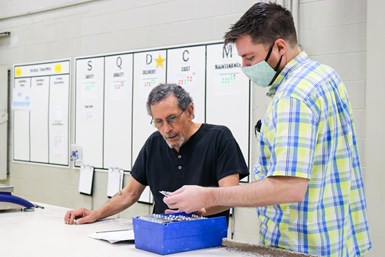
Structured meetings have opened up communication across the companies. Tight inner circles are now opened up to other key team members, giving employees access to more information.
Beck and Butler's leadership approach is to be supportive and help the team accomplish its objectives, but not to tell the team how to do it. They want these businesses to be able to run on their own. "Plus, they understand the required capital investment and the need to add capability if you're going to grow and maximize the efficiency and the utilization of what you have in your shop," Nystrom says.
For those shops out there considering an acquisition, Nystrom advises preparation. "Ensure you have a solid management team in place, understand your growth story, learn to be proud of who you are, talk to other people that have been through this and work with an M&A firm."
For those shops in the throes of the early stages of new ownership, Nystrom emphasizes the importance of being open to change. "No one should change just for the sake of change, but you should also not keep doing something just because you've always done it that way."
"Beck and Butler understand the required capital investment and the need to add capability if you're going to grow and maximize the efficiency and the utilization of what you have in your shop," Howard Nystrom, general manager and president of JMC Machine & Tool says.
Moving Forward and Doing the Right Thing
With the B-Square family, it's all about allowing employees to take ownership in everything they do and instill pride. "Mark and Tony stress that it's not about them. It's not about me. It's not about management. It's about the team," Jones says.
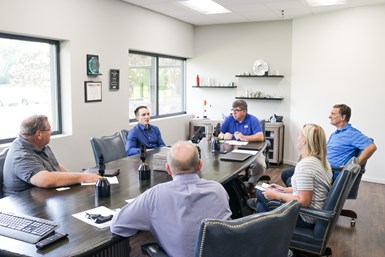
Beck and Butler's main pushes are for data-driven approaches, leadership training, improved collaboration among employees and more cross-pollination of customers.
The key to B-Square's success has been its core values—two people from different backgrounds joining together who have high integrity, possess different skillsets and experiences, but maintain a shared vision and goal which includes caring about the individual and wanting to make the world a better place.
"First and foremost, we want to do what's right for the people, and then all the other things follow. We care about doing the right thing," Butler says.
Related Content
What is Driving Mold Lifecycle Management Digitalization?
OEMs are looking to partner with suppliers to share and track data across the supply chain for advanced intervention and process management.
Read MoreThe Role of Social Media in Manufacturing
Charles Daniels CFO of Wepco Plastics shares insights on the role of social media in manufacturing, how to improve the “business” side of a small mold shop and continually developing culture.
Read MoreThe Critical Role of Management Representatives in ISO 9001
In ISO 9001 quality management systems, the Management Representative (MR) plays a crucial role. While the 2015 version of ISO 9001 no longer mandates this position, having a trusted management member serve as an MR remains vital for streamlining operations and maintaining quality standards.
Read MoreThink Safety: Eliminate Hazards Throughout the Shop
The tooling community is taking advantage of new products for safer mold shops and molding facilities.
Read MoreRead Next
MMT Chats: Tips for a Successful Acquisition
MoldMaking Technology Editorial Director Christina Fuges chats with Fran Brunelle, President of Accelerated Manufacturing Brokers about the ins and outs of today's successful manufacturing mergers and acquisitions.
Read MorePreparing for Mergers and Acquisitions: Interest Areas
Understanding the most intense mergers and acquisitions interest areas and the differences between processor and moldmaker, mergers and acquisitions will better prepare mold builders for the process.
Read MoreHow to Use Continuing Education to Remain Competitive in Moldmaking
Continued training helps moldmakers make tooling decisions and properly use the latest cutting tool to efficiently machine high-quality molds.
Read More























